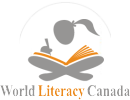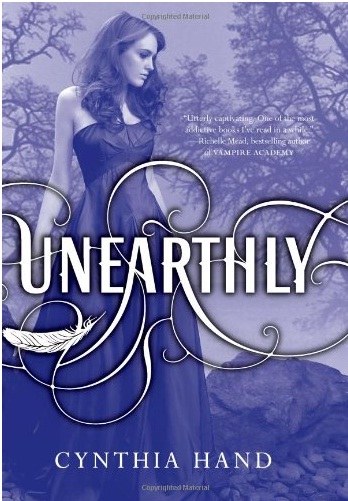
Ana's Rating
Readers Rating
In the beginning, there’s a boy standing in the trees . . . .
Clara Gardner has recently learned that she’s part angel. Having angel blood run through her veins not only makes her smarter, stronger, and faster than humans (a word, she realizes, that no longer applies to her), but it means she has a purpose, something she was put on this earth to do. Figuring out what that is, though, isn’t easy.
Her visions of a raging forest fire and an alluring stranger lead her to a new school in a new town. When she meets Christian, who turns out to be the boy of her dreams (literally), everything seems to fall into place—and out of place at the same time. Because there’s another guy, Tucker, who appeals to Clara’s less angelic side.
As Clara tries to find her way in a world she no longer understands, she encounters unseen dangers and choices she never thought she’d have to make—between honesty and deceit, love and duty, good and evil. When the fire from her vision finally ignites, will Clara be ready to face her destiny?
Unearthly is a moving tale of love and fate, and the struggle between following the rules and following your heart.
In the past year, I’ve read a couple of books about angels. Hush, Hush (by Becca Fitzpatrick) was boring. Fallen (by Lauren Kate) was, honestly, probably the worst YA book that I’ve ever read. City of Bones was amazing… but, I reasoned, that might be because the plot wasn’t entirely focused on being part angel. So I was reluctant to read Unearthly. I picked it up and put it down on more than one occasion in more than one bookstore. But the other day one of my friends lent it to me with a wholehearted recommendation, so I decided to give it a try. It couldn’t be worst than Fallen, right?
I would like to thank my friend for lending me this book, despite my prejudices. Unearthly was amazing. A fast read, a good read, and a must read.
The characters were very well-written. They stayed true to themselves to the end and had serious depth. They all, Kay, Tucker and Christian especially, surprised me with their motives, actions and feelings… but I quickly realized that what they were doing made perfect sense, once I got to know them better. After reading the first few chapters, I had thought that Christian would only have been portrayed throughout the whole book as a name, a face, and a hot bod’. I was very pleased when I got to know him as person, rather than a daydream. I also thoroughly enjoyed reading the book through Clara’s point of view. She was heavily burdened and even though she had a couple of realistic breakdowns, she was a strong female character. I wish I could see more of those.
I could tell you guys about the complete lack of plotholes, the originality, the sense of humor, or even the cute setting of Unearthly. But what I really, really, want to tell you all about is the ending. Oh. My. Goodness. The ending. The ending! The funny thing about this book is that Clara receives her Purpose, the angelic task that every angel-blood must complete, in the form of dreams from the first sentence of the first chapter. As a reader, you’ll quickly realize that Unearthly will end with Clara’s Purpose. No big whoop, right? She’s been daydreaming about the the novel’s conclusion throughout the whole freaking book! So you think you’ll have seen it coming… but trust me. You haven’t. You haven’t! It’s been 5 days since I’ve read this book and I still can’t get over the awesome ending! If that’s not a good book, then I don’t know what is.
Finally, Unearthly gets 4.3/5 stars. I’ve said this on Twitter, and I will say it again: drop everything you’re doing and read this book! It’s worth it.
I’ll keep you posted,

Ana's Rating
Readers Rating
Scarlett and Rosie March have spent years hunting the Fenris– werewolves who took Scarlett’s eye in a brutal attack years ago. Donning blood-red cloaks and wielding deadly hatchets, the sisters kill Fenris to protect other young girls from a grisly fate. Yet even as the Fenris seem to be gaining power, Rosie dreams of a life beyond wolves. She finds herself drawn to Silas, a young woodsman who is lethal with an ax and is Scarlett’s only friend– but does loving mean betraying her sister and all that they’ve worked for?
I came into this read with low expectations. I had just read Red Riding Hood a few weeks ago, and I was drastically disappointed by the awful retelling of such an amazing fairytale as Little Red Riding Hood. But I bought Sisters Red nonetheless. How could a book with such a super awesome cover be bad, right?
This book definitely exceeded my expectations.
For one thing, I loved the setting. Scarlett and Rosie’s home town, with the rolling hills, the pastures, and the nearest store being 20 minutes away by car, really screamed out ‘”Fairytale!”. The setting changes about 4 chapters into the novel in order for the plot to advance, but the lingering fairytale feeling remains.
Next, the Fenris. After Twilight, how many books have I read about hot werewolves? How about… too many? When’s the last time you’ve read a YA book about an evil, soulless monster? Too long ago, my friend. Too long ago. I would personally like to thank Jackson Pearce for reintroducing a YA book with a strong romantic sub-plot that involves a monster that is not a pathetic excuse for that title. The Fenris in Sisters Red were absolutely refreshing.
Scarlett and Rosie’s relationship is complicated. Having lost her right eye at age ten to protect Rosie from a Fenris that killed the girls’ grandmother, Scarlett is bitter and scarred. She is jealous of her sister’s beauty, but desperate to keep her that way. Rosie alternates between being angry at her sister for not letting her hunt the Fenris enough, to not wanting to hunt the Fenris at all, but doing so anyway because she owes Scarlett her life. Scarlett refuses to let Rosie hunt alone, but feels disgusted at her for thinking of quitting.
Scarlett’s attitude toward anyone who doesn’t drop everyone and everything to hunt werewolves is, to put mildly, disgust. She calls girls who beautify themselves ‘Dragonflies’, and marvels at their stupidity for making themselves more appealing to werewolves. This is quite hypocritical really, because the Dragonflies are completely ignorant of the girl-eating Fenris that would love to tear them to pieces and eat their hearts. However, in between the lines of Scarlett’s hateful feelings is jealousy. This makes Scarlett a very believable and deep character… if you knew that you could save the world from monsters, but that it would make you ugly, you would save the world anyway, right? But wouldn’t that also make you resentful of the beautiful people whom you were saving? Pearce works through Scarlett’s tangled thoughts quite well.
I had three issues with Sisters Red: a certain romantic relationship, Rosie’s ‘forgetfulness’, and the predictability of the book’s outcome.
Two characters become involved together romantically. This is a bad relationship for a couple of reasons; first of all, the age difference. A schoolgirl (or, in this case, a teenager), should not be dating someone who is their twenties. A man should not be going out with someone who can barely drive a car. This should just. Not. Be happening. Like so many others, I would have been okay with the age difference if it were addressed for even a sentence in Sisters Red. But Pearce acts as if it’s no biggie. Secondly, the girl in this relationship basically lives off of the man’s money. She didn’t finish high school, has never had a job, and has no marketable talents whatsoever other than, oh yeah, she can fight werewolves. ‘Cause that sounds great on every job application…
And then there’s the fact that Rosie always forgets her hunting knives. She’s seen werewolves in what, 6o public places? Yet she constantly forgets the tools for her greatest asset against the them: her aim. And she’s supposed to be a smart character? Uh-huh.
The solution to the plot’s main mystery was also very predictable. I saw it coming about 7 chapters before it unfolded. This causes the pace to lag somewhat.
Finally, Sisters Red deserves 3.5/5 stars. For fans of creepy monsters and action/romance novels.
I’ll keep you posted,
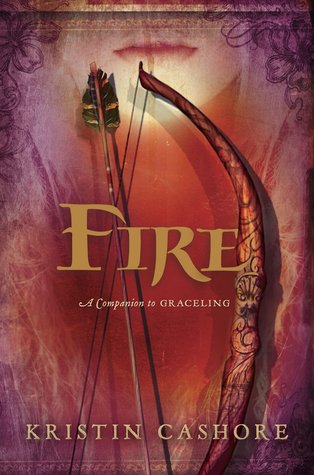
Ana's Rating
Readers Rating
It is not a peaceful time in the Dells. The young King Nash clings to his throne while rebel lords in the north and south build armies to unseat him. The mountains and forests are filled with spies and thieves and lawless men.
This is where Fire lives. With a wild, irresistible appearance and hair the color of flame, Fire is the last remaining human monster. Equally hated and adored, she has the unique ability to control minds, but she guards her power, unwilling to steal the secrets of innocent people. Especially when she has so many of her own.
Then Prince Brigan comes to bring her to King City. The royal family needs her help to uncover the plot against the king. Far away from home, Fire begins to realize there’s more to her power than she ever dreamed. Her power could save the kingdom.
If only she weren’t afraid of becoming the monster her father was.
Fire’s father was not a kind man. Cansrel was not loyal, or compassionate, or gentle. Manipulating the king, killing the women he slept with so he would not reproduce, and basically leading the Dells to ruin, he was not particularly nice. But Cansrel forgot to murder Fire’s mother, so he was left with his monster child, Fire.
Fire’s father was not a kind man. But he loved her nonetheless. And maybe that’s why this story, having only existed as a result of Cansrel, is such an interesting one. Can a person who loves another person really be evil?
While coming to terms with her past and her present, Fire proved to have unusual depth. Her moral debates, her strange acceptance of all things bad in the world, and her refusing to use her powers was captivating. Did I not mention her powers? Being a monster, Fire is a gorgeous creature whose beauty enables her to control the minds of those around her. However, because she was dually raised by Cansrel and her neighbor Brocker, Fire has a strong moral compass that prevents her from using her powers in anything but self-defense. The way Fire improved herself throughout the novel was also interesting, although a slight setback of this improvement 85% of the way through the book was dissapointing and inconsistent. I feel like Fire went from being a good if slightly hurt character, to facing her present, to facing her past, to becoming totally useless, and then back again.
I have only one other issue with Fire:
Raptor monsters can fly, right? So how come no raptors have ever made their way through the mountains to the the Seven Kingdoms, especially since Fire takes place before Graceling?
But back to the praise…
Brigan was an enrapturing character. I loved that, even towards the beginning of the novel, you really got to see behind his ‘tough war commander’ facade. As I found out more about his past, I became even more entranced with him.
The other members of the royal family were equally deep and amusing. Nash was charismatic and just the tiniest bit like his puppet father Nax. Clara was bubbly, sweet and perceptive. Garan was… well, in one word, severe. But he had a lighter side as well. And Roen was insightful, honest, kind and motherly.
I also loved the Dells. The uprising of Lords Mydogg and Gentian was perfect; these characters were genuine and their actions were realistic. If our real, non-fictional world were subjected to the reign of Cansrel and Nax, as were the Dells, I can very easily imagine our society responding as did Cashore’s. Some people would try to gain power stupidly, as did Gentian. Some would be more clever in trying to become more powerful, such as Mydogg. Some would ally themselves with the throne and put their all into peace, like Fire. And some would simply sit back and wait to see who their new ruler would become.
Fire‘s mystery was so much more well written than that of Graceling. It was way better thought out, a lot more suspenseful and very engaging and engrossing. The prologue, a hint to the solution of the mystery, was very creepy and strangely fitting.
Fire merits 4.3/5 stars. For fans of Cashore’s first book, Graceling, and political intrigue. The only reason that I’m not rating it as well as I did Graceling is because the plot and the pacing were somewhat lacking.
I’ll keep you posted,
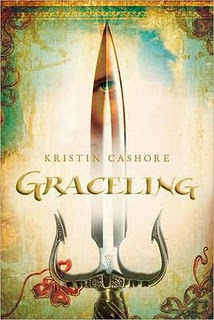
Ana's Rating
Readers Rating
Katsa has been able to kill a man with her bare hands since she was eight–she’s a Graceling, one of the rare people in her land born with an extreme skill. As niece of the king, she should be able to live a life of privilege, but Graced as she is with killing, she is forced to work as the king’s thug.
When she first meets Prince Po, Graced with combat skills, Katsa has no hint of how her life is about to change.
She never expects to become Po’s friend.
She never expects to learn a new truth about her own Grace–or about a terrible secret that lies hidden far away…
In the land of the Seven Kingdoms, few people are Graced, able to excel at a certain talent. Those who are, however, are feared, shunned, and given to their king, so he may use them to his advantage. Some Graces are banal–such as the ability to juggle or sing particularly well.
And some Graces are fatal.
Katsa is Graced with killing. She is forced to deal out King Randa’s punishments by dismembering, maiming and publicly murdering those who disregard his will. She is known throughout the Kingdoms as King Randa of the Middluns’s Lady Killer: Dangerous. Cruel. Unbeaten.
But one day, while doing buisness for the Council, a committee that Katsa began in order to save the Kingdoms from their arrogant kings, Katsa meets her match. Prince Po, Graced with combat skills, is an opponent that Katsa has difficulty beating. (Difficulty! Unheard of!) This brings the two of them into an unlikely friendship that changes the course of the future of the Seven Kingdoms.
Graceling is an amazing book. The characters had distinctive personalities and depth. The idea of Graces was so original. Not once did I ever think “Hmm. This idea was better executed in this book. This plot resembles that of this book.” No, Graceling was completely refreshing and new.
The world building. Whoa. Wow. Dang. This is the kind of world building that I fawn over, gush over, and talk about for weeks. This is the kind of world building that deserves a medal, a trophy, or in the very least, a recommendation. The Seven Kingdoms all have individual landscapes and tendencies. The kings are realistically portrayed as power-hungry and arrogant. The land has just enough chaos to seem genuine, but not enough so that the Kingdoms actively engage in war. The paranoia, fear and shunning of Graces is truthfully depicted–I can imagine the same attitude towards them if they appeared in our world.
I’ve read so many reviews bashing on Katsa. I don’t agree with them. Yes, Katsa has trouble controlling her temper and probably needs anger management. Yes, she’s physically violent . Yes, she can be selfish. Yes, she has a deep fear of commitment and relationships. Yes, she never outgrew the tom-boy phase most girls go through at some point in their lives, and therefore rejects dresses, jewelry and pretty hair.
This makes Katsa harder to relate to, but it doesn’t make her any less realistic.
I’ve also read some reviews claiming that Katsa has no-strings-attached sex with another character. This is not the case. Katsa has feelings for this character, she cares about him, and they have sex. Just because they do not wish to get married, which is an offense in Cashore’s somewhat-medieval world, does not make their relationship any less credible. If Katsa believes that getting married is losing herself, so be it. I appreciate her honesty and her self-respect. Besides, look at most young adults today: do they form relationships only in the hopes of getting married? No. They date because they like each other, they’d like to explore their feelings, and being with someone who likes you is better than being alone.
Only a couple of things could have been improved in Graceling:
1: How Cashore gives hints towards the solutions of some mysteries, but doesn’t give readers enough time to figure them out on their own. She could have left, at the bare minimum, one or two chapters between the presentation of the mystery and the hints towards its solution, and another 2 chapters between the hints and the solution itself. This would have increased Graceling‘s suspense and kept more people interested.
2: The ending. There’s not supposed to be a second book about Katsa and Po, but I found Graceling‘s ending to be somewhat of a cliffhanger.
My final statement: An amazing book. For everybody. 4.9/5 stars.
I’ll keep you posted,
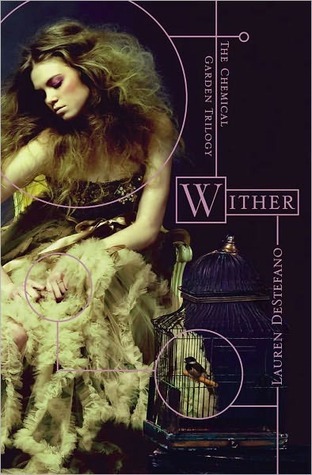
Ana's Rating
Readers Rating
Thanks to modern science, every newborn has become a ticking genetic time bomb–males only live to age twenty-five, and females only live to age twenty. In this bleak landscape, young girls are kidnapped and forced into polygamous marriages to keep the population from dying out.
When sixteen-year-old Rhine Ellery is taken by the Gatherers to become a bride, she enters a world of wealth and privilege. Despite her husband Linden’s genuine love for her, and tenuous trust among her sister wives, Rhine has one purpose: to escape–to find her twin brother and go home.
But Rhine has more to contend with than losing her freedom. Linden’s eccentric father is bent on finding an antidote to a genetic virus that is getting closer to taking his son, even if it means collecting corpses in order to test his experiments. With the help of Gabriel, a servant she is growing dangerously attracted to, Rhine attempts to break free, in the limited time she has left.
Here are the basics of Destefano’s dystopian, post-apocalyptic world:
– North America is the only continent that exists.
– A cure for bearing biologically and genetically unfit children was invented 70 years ago. It worked, and the First Generations, who are healthy, hearty 70-year-olds in the novel, were born.
– But–whoopsie! All of the children of the First Generations, and their children, and their children, etc, die at 20 if they’re female, and 25 if they’re male due to one (uncured) disease.
– Girls are frequently kidnapped and sold into polygamous marriages in order to maintain the Earth’s population.
Here are the issues that I had with Wither:
– Why are their no other continents? War? Disease? Natural disaster? Did North America just decide to bomb every other continent? I would have liked more information about this.
– Why would everyone in the U.S. just up and accept to get a cure that genetically modifies their children? Or, more importantly, how? Due to the strong social, religious, ethical and economic variety of the American population, I have a hard time believing that every single American got that cure. Or was it mandated by the government? I don’t know. Destefano doesn’t say.
– Think about all the diseases in this world. When has one killed every single one of its victims at the same time? Not to mention the fact that this specific disease kills women a whole 5 years before men, while it is a known fact that females generally live longer than males and get fewer diseases.
– The Gatherers kidnap a slew of girls and sell them into polygamous marriages. If the girls aren’t sold right away, the Gatherers kill them. Why? Why do they kill womb-bearing females if girls are so precious, because they can procreate, that they are sold?
– Rhine enjoys eating strawberries and other fruits. Where does this fruit come from? If the environment has shifted and Florida has snow, and no other, warmer, continents exist, where does all that fruit come from? What about all the other materials usually imported from other continents? I’m hoping that what Rhine knows about the rest of the world is just propaganda, and she will discover in the next book, Fever, that the rest of the world does, in fact, live. This would be completely understandable and an interesting plot twist. But there are no hints to indicate this in the first book.
All right. Obviously Wither‘s world building was lacking. But I truly, honestly and utterly enjoyed Wither. I love the poetic, imagery-infused way that Destefano writes, and often found myself lost in her words.
I love the characters. Rhine is a great heroine who had to choose so many times between luxury and freedom that I questioned the choices myself. Would you rather die in satin sheets, eating candy and being content, or scraped, bruised and muddied from escaping, in a place where you can barely afford food, with someone you love? The decision isn’t as easy as I first thought it to be.
I equally enjoyed Rhine’s sister wives. There’s Jenna, the motherly, melancholy, exotic 19-year-old sister wife, and Cecilia, the naive teenager, whom I found more pitifully mislead than amusing, but I loved nonetheless.
It was amazing how Destefano portrayed her characters. The bad guy, Rhine’s father-in-law, was only evil because he wanted to protect and cure his son (and how could that be evil?), and Rhine, the main protagonist, isn’t all good either. The gray between the traditional moral black and white of society was honest and inspiring.
I give Wither 3.5 stars. Enticing, unsettling and bold, with majorly awful world building.
I’ll keep you posted,



![[Twitter]](http://www.whatyareading.com/wp-content/plugins/bookmarkify/twitter.png)
